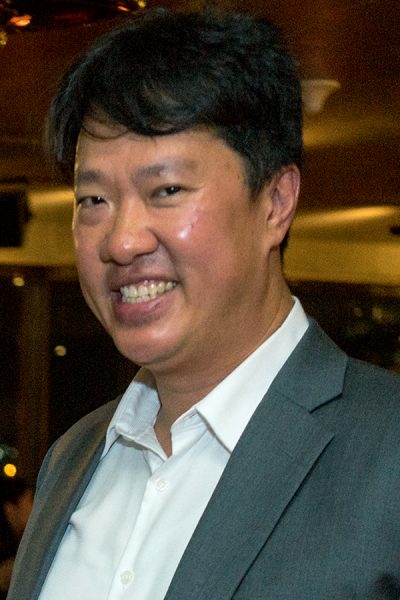Tang Chi Lin
Tang Chi Lin:
Adapting to Tomorrow’s
Challenges
For more than 20 years, Tang Chi Lin has been in the business of readiness. Currently the Head of Sales & Marketing at TÜV NORD Group Singapore, he applies data science and his deep knowledge of the automotive, industrial, and energy-related industries to prepare clients to adapt and thrive in the industries of tomorrow. Chi Lin has spent years around the globe—from the United States to the Middle East to Papua New Guinea – discovering what makes markets tick, and helping enterprises gain a foothold in frontier markets. For someone attuned with the future, he is very much a man of the past. An NUS alumnus possessing a Bachelor of Arts in History, Chi Lin peeks into the past to gain insights into the future.

HOW HAS YOUR PROFESSIONAL JOURNEY BEEN LIKE?
What’s unique is my time spent overseas. The United States, and some countries perceived as “high risk” but where there’s money to be made - Kurdistan, Iraq during second Gulf War, Oman, Papua New Guinea—these places have had profound impact on my career.
WHAT WAS THE MOST VALUABLE LESSON YOU’VE LEARNT FROM YOUR TIME IN NUS?
In history class, I’ve learnt the present is shaped by past events. And what’s happening today would hold key to the future. How true. I was in the States during the dot-com boom and crash. That same euphoria, and debt-driven business growth, is manifesting all over again. How do we prevent greed from squandering investor value?
WHAT HAS BEEN THE MOST FULFILLING PART OF YOUR CAREER SO FAR?
At present, it’s the ability to mentor. I lead teams consisting of younger people, all brilliant in their areas of technical proficiency. Using social science principles, I help them explore the human-to-human element that drives business success.
WHAT ELSE DO YOU ASPIRE TO ACCOMPLISH?
Digital technologies have created perception that human touch is no longer needed in business. I’m trying to dispel that myth. Positive customer experiences, between living, breathing persons, are required to drive predictive data models. In my work domain, I’m using proof-of-concepts to help my clients build digital storefronts and improve experience for their customers.
PRIOR TO RETURNING TO SINGAPORE, YOU WERE BASED IN SAN FRANCISCO AND THE MIDDLE EAST. HOW WAS IT LIKE THERE? HOW HAVE YOUR EXPERIENCES THERE INFORMED YOUR MANAGEMENT STYLE AND PHILOSOPHY?
“Culture eats strategy for breakfast” – that famous quote from Peter Drucker would sum up my experience in American and Middle East markets. Culture of innovation and individualism has made America great, but also generates greed which divide the country. It’s the opposite in the Arabian Gulf states. Culture of family and community is very strong, but sometimes at the expense of economic progress. This has shaped my management style – how to shape a corporate culture that’s performance driven, yet doesn’t destroy itself through selfish individual ambition?
YOU’VE NAVIGATED VARIOUS INDUSTRIES AND SECTORS, FROM THE GOVERNMENT TO OIL TO FLUID SYSTEMS TO STANDARDS SOLUTIONS. HOW WERE YOU ABLE TO NAVIGATE ACROSS THESE DIVERSE ENTERPRISES?
I suppose my ability to adapt is considered a good skill to have. Curiosity forms a large part of my work ethic, even in areas not relevant to my business. As strong believer in lifelong learning, well before it became fashionable, I’ve gone back to school every five or 10 years if my finances permit. It helps that my job roles are mainly people-facing, so I learn as much as I can from people I meet.
DATA SCIENCE IS AN IMMENSELY IMPORTANT FIELD THESE DAYS—ONE THAT YOU HAVE BEEN DEEPLY INVOLVED WITH. WHAT IS THE FUTURE OF BIG DATA IN YOUR INDUSTRY?
When I graduated in 1997, “market research” meant the conduct of surveys to hundreds, perhaps thousands of respondents. Yet error is always present. Data science has narrowed gap between sample and population sizes, so a reliable, predictive model is now within reach. Network speeds and affordable storage have further reduced time-related and data-collection errors. So in my industry, this is being applied to lower manufacturing defects, automate cybersecurity risk detection, computer modeling of industrial activity deemed too dangerous even for experiments.
GIVEN YOUR FAMILIARITY WITH FASS 2.0, PLEASE SHARE WITH FUTURE STUDENTS ITS POTENTIAL AND HOW YOU FORESEE IT HELPING STUDENTS SEEK A FULFILLING CAREER LIKE YOURS?
There’s an advertisement that says “tomorrow’s jobs are not invented yet”. I’ve always believed an FASS education, of all disciplines, is best in adaptation to shifts in space and time. The 2.0 iteration will add the soft skills component, skills that previous batches would acquire only after five years of working experience, if at all. So that’s cutting edge for students seeking to survive and thrive in the age of disruption.

